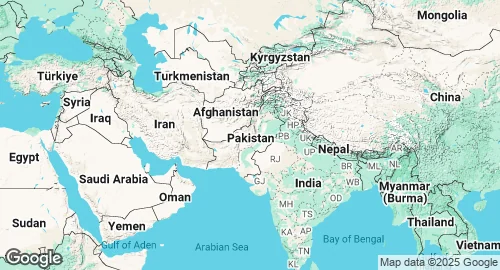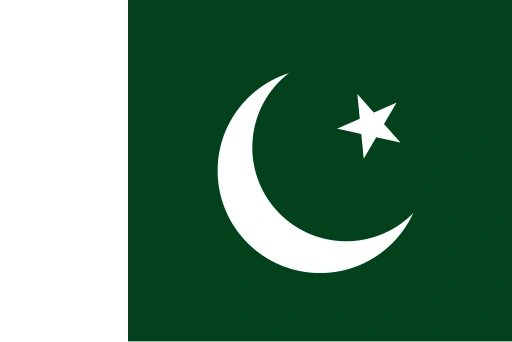Pakistan Military Forces 🇵🇰
Military Strength Overview
| 🛩️ Air Force | 1,396 active aircraft |
| ⚓️ Naval forces |
109 ships in fleet
– incl. 8 submarines |
| ☢️ Nuclear Arsenal | 170 warheads |
| 🪖 Active Troops | 660,000 personnels |
| ⛑️ Reserve Troops | 550,000 personnels |
| 👮♀️ Paramilitary | 291,000 personnels |
| 🗺️ Air bases | 33 active air bases |
| 🎖️ Military ranks | 57 ranks listed |
Global Military Index
| 🪖 Manpower (15%) | 85.9 | Active, reserve & paramilitary: 1022300 effective |
| 🛡️ Ground Firepower (20%) | 76.0 | Main battle tanks: 2627 |
| ⚓ Naval Power (20%) | 52.8 | Weighted by ship type: carriers, submarines, destroyers... |
| ✈️ Air Power (25%) | 70.0 | Weighted by aircraft type: combat, bombers, helicopters... |
| ☢️ Nuclear Deterrent (10%) | 55.8 | Strategic arsenal: 170 warheads |
| 💰 Defense Budget (10%) | 61.6 | $10166M annual military spending |
Methodology: Log-scaled composite index using SIPRI, IISS, and GMNET data. Each pillar is normalized to 0-100, then weighted by strategic importance.
Defense Statistics & Key Metrics
| Population | 247.5 million (2023) |
| GDP | $337.9 billion (2023) |
| GDP per capita | $1365 (2023) |
| Military Budget | $10.2 billion (2024) |
| Share of GDP in Milex | 2.7% (2024) |
| Share of Govt Expenditures | 13.8% (2024) |
| Military spends per capita | $41 (2024) |
| Inflation Rate | 12.63% (2024) |
| Military Personnel | 943,000 (2020) |
Pakistani Military Budget History
Population and Military Personnel Trends
GDP and Inflation Rate Trends
Strategic Overview in 2026
Strategic Position
Pakistan maintains a defense posture centered on a persistent rivalry with India and security challenges along its western borders with Afghanistan and Iran. The primary security concern remains the territorial dispute over Kashmir, which led to a military escalation in May 2025. Following an attack in Indian-administered Kashmir in April 2025, both nations engaged in a four-day conflict involving airstrikes, drone operations, and artillery exchanges before a ceasefire was established.
National defense doctrine is defined by Full Spectrum Deterrence (FSD). This strategy aims to deter conventional and unconventional threats at every level of the escalation ladder, from sub-conventional operations to strategic nuclear engagement. The doctrine specifically addresses India’s "Cold Start" or Proactive Operations Strategy by maintaining high readiness for rapid response.
Pakistan maintains a foundational alliance with China, codified through the China-Pakistan Economic Corridor (CPEC) and extensive defense co-production. In September 2025, Pakistan signed the Strategic Mutual Defence Agreement (SMDA) with Saudi Arabia, formalizing long-standing military cooperation and establishing a framework for joint industrial ventures. Pakistan is also a member of the Shanghai Cooperation Organisation (SCO) and retains Major Non-NATO Ally (MNNA) status with the United States, primarily for counter-terrorism cooperation.
Military Forces
The Pakistan Armed Forces are organized under a centralized command structure. Following reforms in 2025, the position of Chief of Defence Forces (CDF) was established to unify command authority over the three service branches, assuming roles previously held by the Chairman Joint Chiefs of Staff Committee. The CDF position is held concurrently by the Chief of Army Staff.
Total active personnel is approximately 650,000, supported by roughly 550,000 reserve forces. Paramilitary forces, including the Frontier Corps, Pakistan Rangers, and the National Guard, comprise an additional 500,000 personnel.
Pakistan Army The Army is the largest branch and is organized into nine corps. It fields a diverse inventory of main battle tanks, including the VT-4, Al-Khalid, Al-Zarrar, and Type 85. Modernization of the artillery branch focuses on long-range precision, utilizing the Fatah-2 and the upcoming Fatah-5 guided multiple-launch rocket systems (G-MLRS). Air defense is integrated through the HQ-9P and LY-80 (HQ-16) missile systems.
Pakistan Air Force (PAF) The PAF operates a tiered fighter fleet consisting of J-10C, F-16, and JF-17 Thunder aircraft. The JF-17 Block III, which features Active Electronically Scanned Array (AESA) radar and PL-15 beyond-visual-range missiles, serves as the primary multi-role platform. The PAF maintains a fleet of Saab 2000 Erieye and ZDK-03 Airborne Early Warning and Control (AEW&C) platforms for network-centric operations.
Pakistan Navy (PN) The PN is expanding its blue-water capabilities and undersea presence. It operates Tughril-class (Type 054A/P) frigates and Yarmook-class corvettes. The submarine service is transitioning to the Hangor-class (Type 039B) boats. The Navy maintains a dedicated air arm for maritime patrol and anti-submarine warfare.
Special Operations and Strategic Capabilities The Special Service Group (SSG) provides specialized capabilities for counter-terrorism and unconventional warfare. The Strategic Plans Division (SPD) manages the nuclear triad, which includes Shaheen and Ghauri ballistic missiles, Babur cruise missiles, and the Ababeel missile system equipped with Multiple Independently Targetable Re-entry Vehicle (MIRV) technology.
Defense Industry
The domestic defense industry is largely state-owned and has shifted toward becoming a significant exporter. Major entities include the Pakistan Aeronautical Complex (PAC), Heavy Industries Taxila (HIT), and Pakistan Ordnance Factories (POF).
In 2025, Pakistan recorded a substantial increase in defense exports, totaling approximately $10 billion in finalized agreements. Notable contracts include a $4.6 billion deal with Azerbaijan for JF-17 Block III fighters and a $4 billion package for Libya involving aircraft and land systems. A "jets-for-loans" negotiation with Saudi Arabia in early 2026 aims to convert outstanding financial assistance into procurement for the JF-17 platform.
While Pakistan remains reliant on China for advanced sensors and engines, HIT and PAC achieve high levels of domestic value-added production for tanks and light-to-medium combat aircraft.
Strategic Trends
The defense budget for the 2025-26 fiscal year was increased to approximately 2.55 trillion rupees (roughly $9 billion), representing nearly 2% of GDP. This allocation reflects the requirement for post-conflict replenishment following the May 2025 escalation and ongoing counter-insurgency operations.
Procurement priorities are shifting toward unmanned systems and electronic warfare. The military has integrated Turkish-made Bayraktar TB2 and Akinci UCAVs, alongside Chinese Wing Loong systems. Future force planning includes the pursuit of fifth-generation stealth capabilities, with the Chinese J-31 (FC-31) designated as a primary candidate for the PAF’s next-generation requirement.
Internal security remains a priority through Operation Azm-e-Istehkam (Resolve for Stability), launched in June 2024 and continuing through 2025. This operation targets the Tehreek-e-Taliban Pakistan (TTP) and Baloch insurgent groups. The military faces constraints from high inflation and national debt servicing, necessitating the use of defense exports to fund modernization programs.
Pakistani Aircraft Manufacturing
| Model | Manufacturer | Year | Number |
|---|---|---|---|
| JF-17 Thunder | CAC / PAC | 2003 | 144 |
| JL-8 | Hongdu | 1990 | 500 |
Pakistani Missile Systems
Frequently Asked Questions
How large is Pakistan's military?
What is Pakistan's defense budget?
How does Pakistan rank militarily in the world?
Does Pakistan have nuclear weapons?
How many aircraft does Pakistan's air force have?
How large is Pakistan's navy?
How many tanks does Pakistan have?
What percentage of GDP does Pakistan spend on defense?
What is Pakistan's military personnel per capita?
Does Pakistan have submarines?
Does Pakistan have paramilitary forces?
Military Expenditure: SIPRI Milex. Suggest a change

